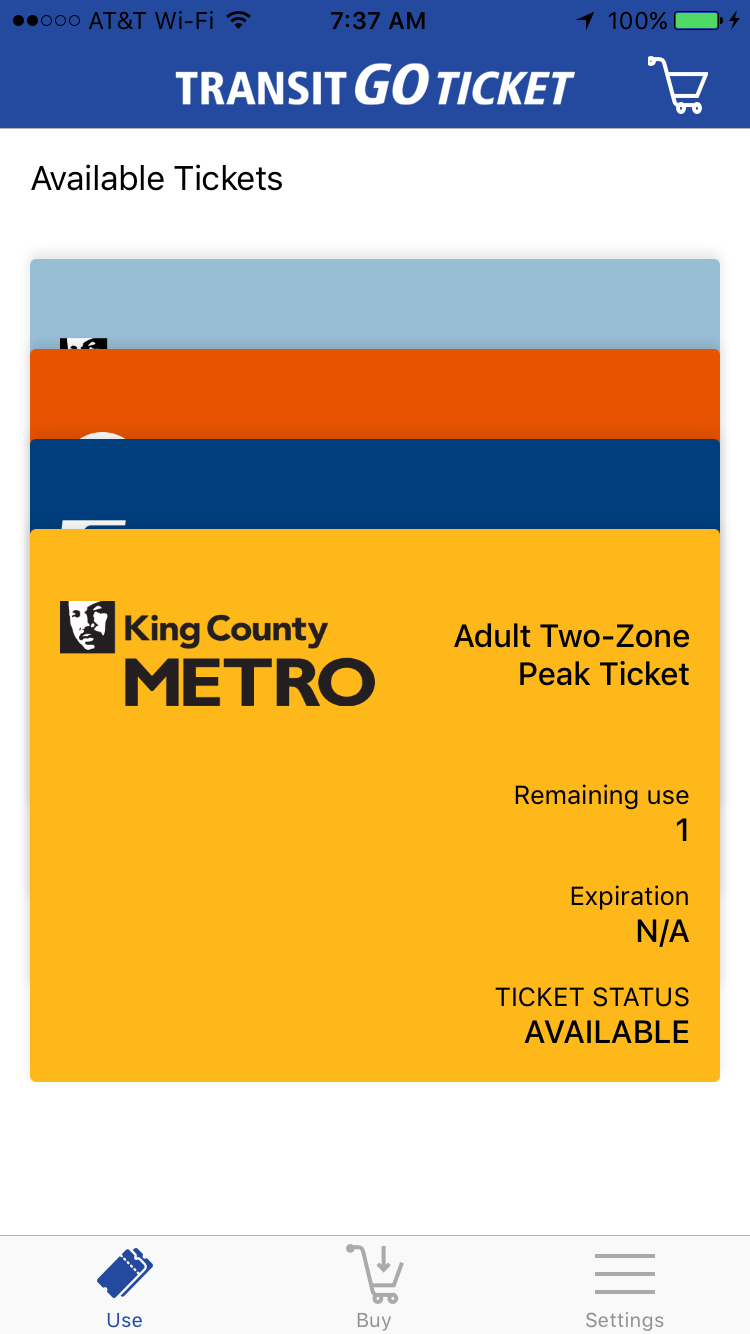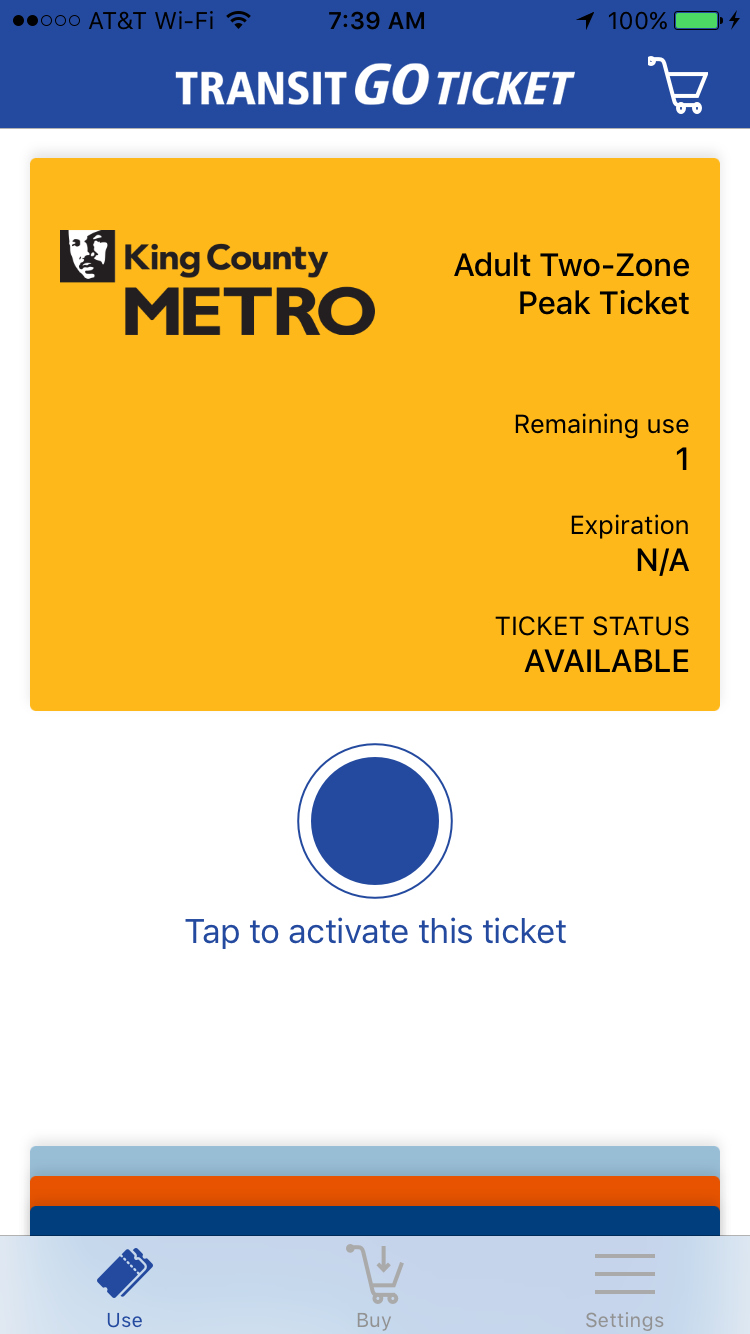Metro and Sound Transit Debut Mobile Fare Payment


Whenever I visit Portland, about 10 minutes before arrival I always buy a Trimet Day Pass for $5 on my phone. This enables occasional users like me to use transit at will without giving a second thought to fare media.
Well, Seattle is finally catching up. On Thursday, King County Metro and Sound Transit will announce Puget Sound's first mobile ticketing app, called TransitGoTicket. The app will allow Metro and (some) Sound Transit riders to purchase tickets and day passes on their phones without having to buy or use an ORCA card. The iOS app is already live, with Android and Windows to follow Thursday.
Of the 7 ORCA agencies, Metro and Sound Transit are the only initial partners, but Metro hopes a successful rollout will entice other agencies to join. The limited participation will lead to some awkward outcomes, especially pertaining to the goal of interagency integration. Whereas ORCA uses card taps to record trips and apportion funds between agencies, mobile tickets will function as flash passes, meaning there is no way to apportion revenue for multi-agency trips. Accordingly, all revenue from app-purchased tickets has to stay within each agency 'bucket', which means no interagency transfers for mobile payment. Riders wanting a true interagency day pass ($8) will still need to purchase one with an ORCA card at a Ticket Vending Machine.
Mobile payment will only be available on Metro, the King County Water Taxi, the First Hill and South Lake Union Streetcars, Link, and Sounder. Metro will offer all of its standard ticket types, while King County Water Taxi will offer single fare tickets at the cash price (ORCA users would still get a discount). Sound Transit will offer day passes only on Link ($6.50) and Sounder ($11.50), priced at 2x the maximum fare. Because ST Express routes are operated by 3 different agencies - Metro operates only 9 of the 28 routes - Sound Transit has decided not to extend mobile ticketing to ST Express until there is broader agency participation.
The complete list of available tickets is as follows:
Metro
- Youth Ticket ($1.50)
- Adult Off-Peak ($2.50)
- Adult 1-Zone Peak ($2.75)
- Adult 2-Zone Peak ($3.25)
Sound Transit
- Link Day Pass - Reduced ($2.00)
- Link Day Pass - Youth ($3.00)
- Link Day Pass - Adult ($6.50)
- Sounder Day Pass - Reduced ($5.50)
- Sounder Day Pass - Youth ($8.50)
- Sounder Day Pass - Adult ($11.50)
Seattle Streetcar
- Senior / Regional Reduced Fare Permit Single Ticket ($1.00)
- Senior / Regional Reduced Fare Permit Day Pass ($2.00)
- Youth Single Ticket ($1.50)
- Youth Day Pass ($3.00)
- Adult Single Ticket ($2.25)
- Adult Day Pass ($4.50)
King County Water Taxi
- West Seattle Senior/Disabled Single Ticket ($2.25)
- West Seattle Youth Single Ticket ($5.25)
- West Seattle Adult Single Ticket ($5.25)
- Vashon Senior/Disabled Single Ticket ($2.75)
- Vashon Youth Single Ticket ($2.75)
- Vashon Adult Single Ticket ($6.25)
To deter riders from quickly buying tickets when they see a Fare Enforcement Officer (FEO), tickets will display a red bar on the bottom of the screen for 2 minutes after purchase, after which the bar will turn its standard color (gold for Metro, blue for Sound Transit, etc). An FEO seeing a red bar would have the discretion to write a ticket if s/he suspects fare evasion, but enforcement will likely be generously lax during the initial education period.

Metro 2-Zone ticket showing transfer letter/color of the day

Riders can be asked to tap the screen to verify ticket validity. If it changes color the ticket is valid..
Though a move to cashless system is a goal of Metro's Long Range Plan, the mobile ticketing pilot is neutral when it comes to fare policy, requiring Metro to offer its standard 2-hour transfer on mobile while not enabling digital transfer fraud. When a ticket is purchased, the ticket screen will display the color and letter matching that day's paper transfer. The display will be animated to deter users from stockpiling screenshots for illegal re-use. Metro drivers suspecting a screenshot ticket would also have the option of asking riders to tap their phone screen, with a change in color (see above) indicating that the ticket is current and valid.
Metro chose Bytemark as the technology vendor, a mobile ticketing startup that recently raised $9.5m in venture capital to expand. Bytemark's mobile fare products can be seen in places such as Toronto, Austin, and the South Shore Line from Chicago to South Bend.
The 6-month pilot project is funded by a grant from the Federal Transit Administration (FTA). After 6 months, Metro and Sound Transit will likely conduct a Title VI analysis before deciding on a 6-month extension. If deemed successful after 1 year, the program would become permanent. Ongoing costs include 1.5% of mobile fare revenue to ByteMark and a $126,000 annual fee once in full production (after the pilot ends). New agencies could join for $45,000.
A well-executed mobile ticketing program in greater Seattle will greatly reduce friction for occasional transit riders. Day pass purchasers will no longer have to incur the nation's highest card fee ($5 for new ORCA cards). Users can buy a handful of tickets or passes in advance for later use at their discretion. Riders wanting a true Link day pass will no longer have to first ride to a terminal station (Angle Lake or UW) to buy one, since current Link day passes are only valid for travel between two stations.
Still, our abundance of agencies will overly complicate things, throttling back near-term possibilities. Common fare products will be missing, such as interagency transfers, single Link tickets, and ST Express tickets. If mobile ticketing is to help ease the eventual transition to cashless payment and further the goal of agency integration, the range of mobile options should be greater than or equal to ORCA, with all seven agencies on board. But though these near-term goals will remain elusive, this is still a huge step in the right direction. Here's hoping for a smooth rollout.